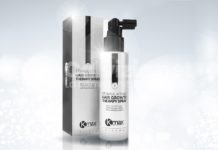Tumor necrosis factor alpha (TNF-a) is a dangerous chemical messenger (cytokine) that incites the immune system to attack healthy tissues throughout the body. Elevated TNF-a causes a systemic inflammatory cascade that results in arthritis, age related neurological problems, vascular complications and the catabolic wasting effect seen in cancer.
Recent studies have conclusively shown that TNF-a plays a central role in the genetically programmed death (apoptosis) of hair cells in MPB (androgenetic alopecia). In fact, it is considered by several leading researchers to be the most significant factor in hair cell death, even possibly more significant than DHT.
There are currently a few TNF-a inhibitors on the market (e.g. Enbrel, Remicade). These drugs are approved for use in the treatment of rheumatoid arthritis and Crohn’s disease. Scalp hair growth has been occasionally observed as a side effect of using these compounds. Unfortunately these drugs are very expensive and administered by injection and infusion only.
Surprisingly, the leaves of the common stinging nettle (Urtica dioica) have been found to contain substances that affect cytokine levels in the human body, particularly TNF-a. Nettle leaf extract has a long tradition as a medical remedy in Germany for inflammatory conditions such a rheumatoid arthritis and allergic rhinitis.
A study by Obertreis, Giller et al. (1996) showed that nettle leaf extract inhibits the expression of several cytokines as well as the formation of pro-inflammatory leukotrienes and prostaglandis, but its mode action has remained unclear. It has now been discovered that the seemingly insignificant herb reduces TNF-a levels by inhibiting a genetic transcription factor known as a nuclear factor kappa beta (NF-kb), that controls the expression of numerous enzymes and pro-inflammatory products including TNF-a (Riehemann K e al., 1999).
In a study done in healthy volunteers (Obertries B, Ruttkowski T e al., 1996) lipopolysaccaride was used to stimulate the secretion of pro-inflammatory cytokines. When nettle leaf extract was given simultaneously, TNK-a concentration was significantly reduced in a dose-dependent manner. Already known as a hair growth promoter in Germany, this plant extract deserves to be known also in this country as an antiaging and vitalizing nutrient.
The most advanced extracts of stinging nettle are available in both the Natural Prostate and Super Miraforte formulas in a sufficient dose to reduce levels of this dangerous pro-inflammatory cytokine.
Br J Dermatol 2000 Nov;143(5):1036-1039
High-dose proinflammatory cytokines induce apoptosis of hair bulb keratinocytes in vivo.
Ruckert R, Lindner G, Bulfone-Paus S, Paus R , Germany.
BACKGROUND: Hair loss following skin inflammation may in part be mediated by keratinocyte (KC) apoptosis. While the effects of different cytokines or other apoptosis stimulating agents such as interferon (IFN)-gamma or tumour necrosis factor (TNF)-alpha on KC apoptosis in vitro have been addressed in several studies, little is known about the effects of proinflammatory cytokines on KC apoptosis in vivo.
Objectives To study the effects of intradermally injected TNF-alpha, interleukin (IL)-1beta and IFN-gamma on KC apoptosis in the back skin of C57BL/6 mice. METHODS: Apoptosis in epidermal and hair bulb KCs was analysed by immunohistology using TUNEL staining.
RESULTS: Injection of TNF-alpha induced a significantly higher number of apoptotic cells within the epidermis than vehicle; all three proinflammatory cytokines together further increased their number. Intrafollicular hair bulb KCs were much more susceptible to apoptosis induction by TNF-alpha or IL-1beta; their injection significantly upregulated apoptosis after 6 h, which was further increased after 24 h. The combination of all cytokines together accelerated intrafollicular apoptosis after 6 h by doubling the number of apoptotic cells per hair bulb, compared with the effects of TNF-alpha or IL-1beta alone.
CONCLUSIONS: These data suggest that programmed cell death of proliferating KCs in vivo can be
induced by proinflammatory cytokines.





























